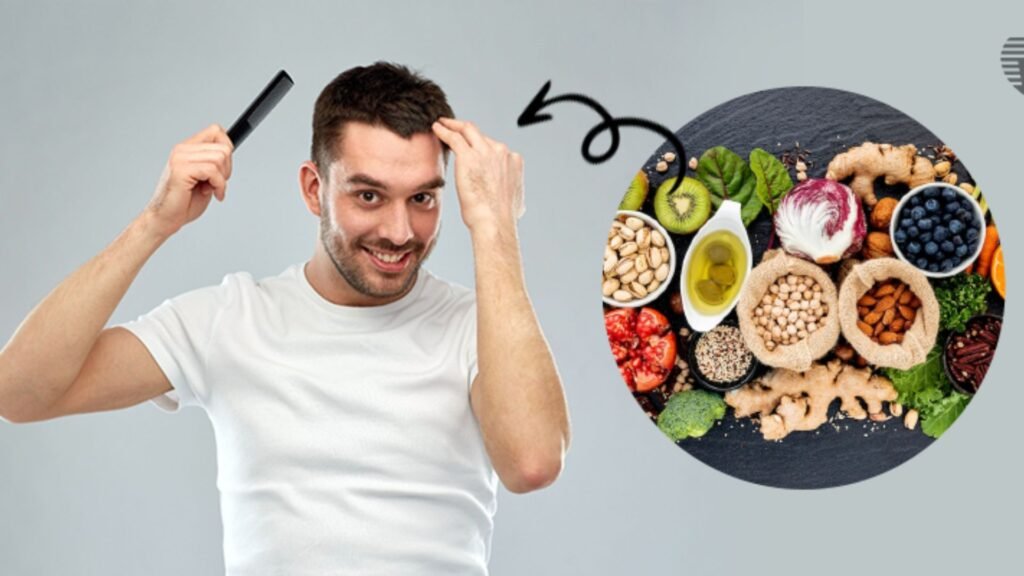What Nutrition Is Needed For Healthy Hair
- By -Patricia Ellsworth
- Posted on
- Posted in Nutrition
Healthy hair starts from the inside out. Just like your skin, your hair needs proper nourishment to grow strong, shiny, and full of life. The right nutrition can prevent hair loss, encourage growth, and give your hair the vitality it deserves. In this article, we’ll explore the nutrition needed for healthy hair, including key vitamins and minerals that support hair health.

1. Protein: The Building Block for Strong Hair
Hair is made primarily of protein, specifically a protein called keratin. If you want healthy, strong hair, protein is the most important nutrient to include in your diet.
- Why It Helps: Protein provides the essential amino acids your body needs to produce keratin, which is vital for hair structure. Without enough protein, your hair can become weak, brittle, and prone to breakage.
- What You Can Do: Include protein-rich foods for healthy hair such as lean meats (chicken, turkey), fish, eggs, beans, lentils, and dairy products. These foods help your body produce keratin and support overall hair health.
2. Iron: Ensuring Proper Oxygen Supply to Hair Follicles
Iron plays a crucial role in delivering oxygen to your hair follicles, which is essential for hair growth and strength.
- Why It Helps: Without enough iron, your body may not be able to deliver sufficient oxygen to the hair follicles, which can lead to hair thinning and hair loss. Iron also helps maintain the health of your scalp.
- What You Can Do: Include iron-rich foods for healthy hair such as spinach, red meat, lentils, chickpeas, tofu, and fortified cereals. Pair these with vitamin C-rich foods like oranges or bell peppers to improve iron absorption.
3. Vitamin C: Aiding Hair Growth and Strength
Vitamin C is essential for the production of collagen, a protein that strengthens hair, and it also plays a vital role in absorbing iron from plant-based sources.
- Why It Helps: Vitamin C promotes the production of collagen, which is a key structural component of your hair. It also helps to protect your hair from damage caused by free radicals and supports overall scalp health.
- What You Can Do: Include vitamin C-rich foods for healthy hair, such as citrus fruits (oranges, lemons), strawberries, bell peppers, broccoli, and kiwi. These foods help stimulate hair growth and prevent breakage.
4. Omega-3 Fatty Acids: Nourishing Your Scalp and Hair Follicles
Omega-3 fatty acids are healthy fats that help nourish your scalp and promote healthy hair growth.
- Why It Helps: Omega-3s support the production of oils that keep your scalp hydrated and your hair shiny. They also reduce inflammation and support hair follicles, which is crucial for preventing hair loss.
- What You Can Do: Include omega-3-rich foods for healthy hair such as fatty fish (salmon, mackerel, sardines), flaxseeds, chia seeds, and walnuts. These foods help keep your scalp healthy and support hair growth.
5. Vitamin A: Supporting Healthy Hair Growth and Scalp
Vitamin A is an essential nutrient that supports healthy hair growth and helps keep your scalp nourished.
- Why It Helps: Vitamin A promotes the production of sebum, the natural oil that keeps your scalp moisturized. A healthy scalp is vital for healthy hair growth, as it creates the ideal environment for your hair follicles to thrive.
- What You Can Do: Include vitamin A-rich foods for healthy hair such as sweet potatoes, carrots, spinach, kale, and egg yolks. These foods help maintain a healthy scalp and support the hair growth cycle.
6. Biotin: Promoting Hair Growth and Preventing Hair Loss
Biotin, also known as vitamin B7, is an important B-vitamin that helps support hair growth and prevent hair thinning.
- Why It Helps: Biotin is involved in the production of keratin, the protein that makes up your hair. A deficiency in biotin can lead to hair thinning, dryness, and brittleness.
- What You Can Do: Include biotin-rich foods for hair health, such as eggs, nuts (especially almonds), sweet potatoes, and avocados. These foods help promote hair growth and improve the strength and texture of your hair.
7. Zinc: Maintaining Healthy Hair Growth
Zinc is an essential mineral that supports hair growth by maintaining healthy hair follicles and regulating hormone levels.
- Why It Helps: Zinc plays a role in hair tissue growth and repair. It also helps maintain the oil glands around your hair follicles, which is crucial for keeping your scalp healthy. A deficiency in zinc can lead to hair loss and slower growth.
- What You Can Do: Include zinc-rich foods for healthy hair such as pumpkin seeds, chickpeas, lentils, oysters, and beef. These foods help regulate the growth of healthy hair and prevent hair thinning.
8. Vitamin E: Protecting Hair From Damage and Promoting Growth
Vitamin E is a powerful antioxidant that helps protect your hair from damage caused by oxidative stress and environmental factors like UV rays and pollution.
- Why It Helps: Vitamin E improves blood circulation to the scalp, promoting healthy hair growth. It also supports the repair of damaged hair follicles and strengthens hair strands.
- What You Can Do: Include vitamin E-rich foods for hair health, such as almonds, sunflower seeds, spinach, and avocado. These foods help nourish the scalp and protect your hair from oxidative damage.
9. Vitamin D: Reducing Hair Loss and Supporting Follicle Health
Vitamin D is essential for the growth and maintenance of hair follicles.
- Why It Helps: Adequate levels of vitamin D can help prevent hair loss by supporting the hair growth cycle. Low levels of vitamin D have been linked to hair thinning and conditions like alopecia.
- What You Can Do: Include vitamin D-rich foods for healthy hair, such as fatty fish (salmon, mackerel), egg yolks, and fortified foods (milk, orange juice). Sun exposure is also a natural source of vitamin D, so try to get outside regularly.
10. Water: Keeping Hair Hydrated and Healthy
Hydration is just as important for your hair as it is for your skin. Dry hair is more prone to damage and breakage.
- Why It Helps: Drinking enough water helps keep your hair hydrated and prevents it from becoming dry and brittle. Hydrated hair is more flexible and less prone to split ends.
- What You Can Do: Drink plenty of water throughout the day to keep your hair hydrated. Aim for at least 8 cups of water daily to support healthy hair growth.
Conclusion
Proper nutrition is the key to achieving and maintaining healthy hair. By including protein, vitamins, minerals, and healthy fats in your diet, you can nourish your hair from the inside out and promote growth, strength, and shine. Focus on biotin-rich foods, omega-3 fatty acids, zinc, vitamins A, C, and D, and adequate hydration to support healthy hair growth. Healthy hair starts with proper nourishment, so make sure you’re feeding your hair the right nutrients it needs to thrive.



